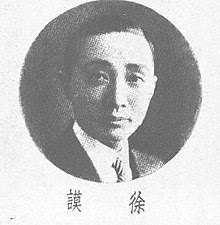Hsü Mo (1893-28 June 1956), lawyer and political scientist, played a key role in the planning and administration of Chinese foreign policy from 1932 to 1941 and served on the International Court of Justice from 1946 until his death; Born into a family of modest means in Soochow, Kiangsu, Hsü Mo received his early education at home under the guidance of his father, who was a teacher, and then attended a local middle school. In 1912 he enrolled at Peiyang University, where he became' known as the most gifted student of English hterature and composition to attend the university since ^Vang Ch'ung-hui i'q.v.) had studied there, and he gained a notable reputation as an excellent public speaker in both Chinese and English. He also studied Chinese and Western law and received an LL.B. degree from Peiyang in 1916.
After graduation, Hsü returned to Kiangsu and taught English at the Yangchow Middle School. In 1919 he ranked first in the government examinations for the diplomatic service. He was sent to the United States for a tour of duty in the Chinese legation, and he served as a secretary to the Chinese delegation at the Washington Conference in 1921-22. He also took law courses at George Washington University and received an LL.M. degree in 1922. At this time, he came to the attention of C. T. Wang (Wang Cheng-t'ing, q.v.), who was the head of the Chinese delegation to the Washington Conference.
After returning to China in 1922, Hsü Mo became professor of law and political science at Xankai University. He gave political science, comparative constitution, and international law courses. During the academic year 1925-26 he also served as dean of the university's college of arts. In 1926 he was made a member of the Chinese Bar Association in Tientsin. He also served as chief editor of the / Shih Pao, an influential Catholic newspaper at Tientsin, and wrote special articles on international affairs for it.
Late in 1926 Hsü Mo resigned from Xankai and moved to Shanghai, where he established a private law practice. In January 1927 the Provisional Court of the International Settlement was inaugurated at Shanghai as a concession to C^hinese demands for judicial sovereignty. Because of his legal training and his familiarity with Anglo-American law and jurisprudence, Hsü was appointed to the court as a judge. He accepted the position eagerly, for he viewed the establishment of the Shanghai Provisional Court as a preliminary step toward the reassertion of China's legal independence, the abolition of extraterritoriality, and the abrogation of the unequal treaties. In late 1927 he became president of the district court at Sungkiang, Kiangsu. ^Vith the emergence of a center of political authority at Nanking in the spring of 1928, new opportunities arose in the field of foreign affairs. Through the introduction of Wunsz King (Chin Wen-ssu), who had been one class ahead of him at Peiyang University, Hsü Mo entered the ministry of foreign affairs as a counselor. In June 1928 C. T. W'ang was made minister of foreign afTairs. At Wang's request, Hsü became his chief aide. In the following six months, he helped Wang to conclude twelve new tariff agreements with as many countries. From January 1929 until January 1932 Hsü served as chief of the ministry's European and American affairs department. In 1929 he served briefly as special commissioner of foreign affairs to deal with the abolition of extraterritorial rights in Shanghai. He also assisted C. T. AVang in gaining the restitution to China of Weihaiwei, reaching an agreement with France regarding Tonkin, signing a new tariff agreement with Japan, and concluding commercial treaties with Greece, Poland, and Czechoslovakia. Japanese aggression in XIanchuria in September 1931 and the attack at Shanghai in January 1932 shifted the focus of Chinese diplomatic attention to the Japanese threat. During the latter part of 1931 Hsü Mo served as acting chief of the Asian affairs department of the ministry of foreign affairs. In January 1932 he became administrative vice minister. He was promoted to political vice minister in June, succeeding Kuo T'ai-ch'i (q.v.). From 1932 to 1941 Hsü played a key role in molding, stabilizing, and administering Chinese foreign policy.
In 1941, at his own request, Hsü Mo was appointed minister to Australia, with the rank of ambassador, although his seniority and record of service qualified him for more prominent posts. He served there during the remaining war years until 1945. The Australians thought him an eloquent public speaker, and Melbourne University awarded him an honorary LL.D. degree. As the war drew to a close, Hsü Mo, as one of China's most experienced diplomats, was drawn into the postwar planning. Early in 1945 he participated in the work of the Committee of Jurists, which met in Washington from 9 to 20 April to prepare the draft statute of the International Court ofJustice. At the United Nations Conference on International Organization in San Francisco, Hsü played an active and constructive role as the Chinese representative on the committee which drafted the section of the United Nations Charter dealing with the settlement of disputes. He also served as ambassador to Turkey in 1945-46.
On 6 February 1946 Hsü was one of thirteen men elected to the International Court of Justice on the first ballot. After three years of service at The Hague, he was reelected for a second term of nine years. Hsü suffered a heart attack and died on 28 June 1956 in the Netherlands.

徐谟
字:叔谟
徐谟(1893—1956.6.28),法律学家,政治学家。1932—1941年在制订和执行中国对外政策起过重要作用,1946年后直到去世之前,任职国际法庭。
徐谟出生在江苏吴县的一个中产家庭,早年由父亲教育在家读书,他父亲是一名塾师后在本地一所中学任教。1912年他进北洋大学,是该校自王宠惠以后在英国文学及英文写作上最有才华的一名学生。他擅长用英语、中文作演讲而颇有声誉。他学习中西法律,1916年获得北洋大学法学士学位。
毕业后回江苏,在扬州中学教英语。1919年政府举行的外交官考试他名列第一。他被派在驻美使馆中见习,1921—1922年任中国代表团秘书,出席华盛顿会议。他又在华盛顿大学学法律课程,1922年获得法学硕士学位。华盛顿会议中国代表团长王正廷很器重他。
1922年回国,任南开大学法律和政治学教授,开政治学、比较宪法及国际法等课程,1925—1926年任该校文学院长。1926年任天津律师协会会员、《益世报》主编,这是天津的一份很有影响的天主教会所办的报纸,徐谟常在上面发表有关国际事务的专论。
1926年末,徐谟辞去南开大学职务去上海挂牌当律师。1927年1月,在司法独立要求的压力下上海公共租界设立了临时法庭。徐谟由于他的专业训练和精通英、美法律及法学,被聘为法官。他热情地接受了这一任命,认为上海临时法庭的成立,是中国重申司法独立、废除领事裁判权、取消不平等条约的第一步。1927年任江苏松江地方审判厅厅长。
1928年春,南京成为政治中心,外交事务方面出现了新的机会,徐谟由他在北洋大学前一班同学金问泗介绍,进外交部当参事。1928年春,王正廷任外交部长,请徐谟当他的主要助理,六个月期间,徐协助王和许多国家签订了十二项关税协定。1929年1月到1932年1月,徐谟任欧美司司长,1929年一度任废除上海治外法权的特别外交专员。他还协助王正廷取得收回威海卫和与法国达成关于东京湾的协议,与日本签订一项关税新协定,与希腊、波兰、捷克签订了商务条约。
1931年9月,日本侵占东北,1932年1月日本又进犯上海,中国的外交中心转移到对付日本的威胁。1931年下半年,徐谟代理亚洲司司长,1932年1月,任外交部事务次长,6月继郭泰琪而任政务次长。从1932年起到1941年,徐谟在中国外交政策的制订、稳定和实行方面起着重要作用。
1941年,经徐谟要求出任澳大利亚大使衔公使,一直到战争结束。尽管就他的资望和经历而论,他是有资格担任更高职务的。澳大利亚的人士认为他是一位雄辩演说家,墨尔本大学授以名誉法学博士学位。
战争渐近结束,作为中国最有经验的外交人员之一,徐被约去担任制订战后规划工作。1945年初,他参加了法律委员会工作,4月9日到21日在华盛顿开会,筹备国际法庭草案。在旧金山讨论国际组织的联合国大会上,徐谟作为联合国宪章起草委员会处理国际纠纷部分的中国代表,曾起了积极的建设性作用。1945—1946年他任驻土耳其大使。
1946年2月6日,第一轮票选他被选为十三人国际法庭的一员。他在海牙任职三年,第二届会议再次当选连任九年。1956年6月28日因心脏病死在荷兰。